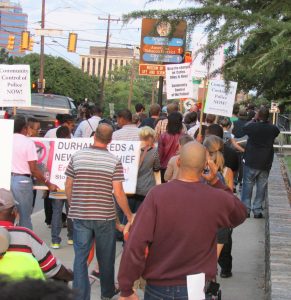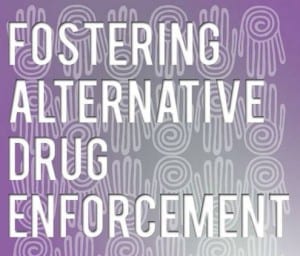Durham has been portrayed as one of the most tolerant cities in America, one of the best places to retire, and home to a rich, diverse community. Many Durham residents, however, see a different reality than that on the travel brochures. The “real” Durham, they say, is also characterized by a systemic sickness within its criminal justice system. Durham PD Racial Profiling data between the years 2000 and 2011 reveals that over the last decade, a black motorist in Durham County was 162% more likely to be searched pursuant to a traffic stop for a seat belt violation than a white motorist stopped for the very same offense. Likewise, a stop of a black motorist for speeding was 109% more likely to result in a vehicular search than a stop of a white motorist for the same offense.
These numbers give Durham the sad distinction of producing the most racialized stop-and-search disparities in all of North Carolina’s 100 counties. In the last year alone, 82.5% of searches conducted pursuant to motor vehicle stops were of African-Americans, a number more than twice the African-American representation in the city population (41%). And the problem is getting worse: In each of the past five years, a greater percentage of searches were conducted on African-American motorists than the year before. The community has had enough, has organized a plan, and wants the police department to acknowledge their past mistakes and foster a Durham that is together, not split into two worlds.
SCSJ is a proud member of Durham FADE (Fostering Alternative Drug Enforcement), a community led coalition dedicated to exploring the impact of the War on Drugs in Durham and focusing on the injustices that occur in the Durham Police Department that disproportionately affect communities of color. FADE members are dedicated to preserving and sustaining the town they call home while also fighting the rooted racial inequities that exist. On September 16th, the FADE coalition marched through Durham demanding police accountability and changes within the department. Community members spoke up and against the racial profiling they have experienced, their neighbors have experienced and their community is experiencing.

Examples include the story of Jose Ocampo, a Honduran father, who was fatally shot by Durham police this summer. The incident was publicly portrayed as necessary use of police force before an official investigation was ever conducted, despite significantly differing accounts from witnesses to the shooting. Stephanie Nickerson, a young African American navy veteran, was brutally beaten by a Durham police officer during a noise complaint. Several months later the officer resigned, but no public apology or admission of wrongdoing ever came. A litany of other stories were also told, all with the same theme: people of color are targeted as criminals, routinely subjected to excessive force, and often ignored as victims.
FADE was also in attendance at the September 19th work session of the Durham City Council. SCSJ attorney and Soros Justice Fellow Ian A. Mance distributed the SCSJ Fact Sheet on Durham Stop-and-Search Data to the mayor and council detailing a litany of gross racial disparities within the city’s criminal justice system. FADE members Ernest Smith, Tia Hall, and Meghan McDowell spoke before a standing room only crowd and demanded the council take action to address the deteriorating state of community-police relations.Other members were not granted the opportunity to speak at the public hearing made videos of their planned testimony, including Mario Pavon, Pastor Cleve May, and Minister Reynolds Chapman.
In response, Mayor Bill Bell directed the city manager to order a hearing before the city’s Human Relations Commission to examine the issues raised by coalition members. That meeting is currently scheduled for Tuesday, October 1st at 7:00pm, and will be held at Durham City Hall. FADE members and SCSJ will be in attendance.
By Madeline Anderson, SCSJ Communications Intern
